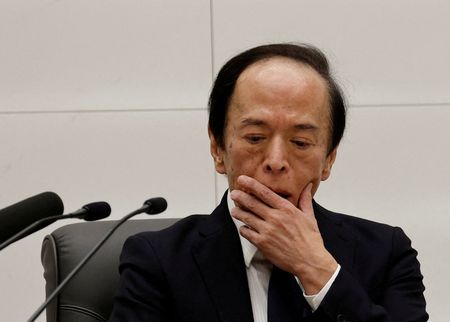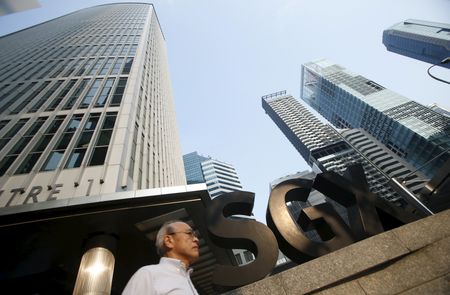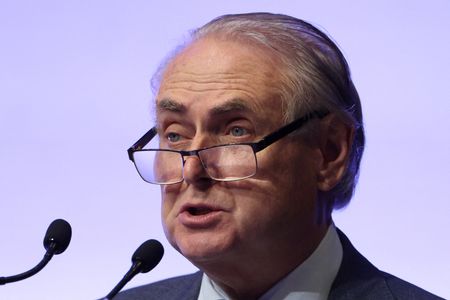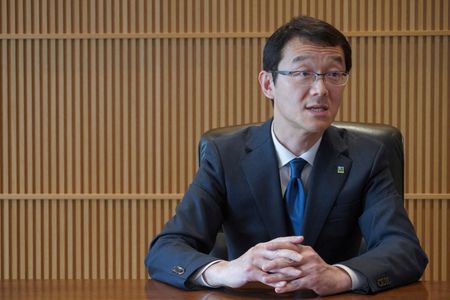By Makiko Yamazaki and Leika Kihara
TOKYO (Reuters) -Bank of Japan Governor Kazuo Ueda and key economic ministers in the country’s new government have agreed to watch market developments with a “strong sense of urgency,” Finance Minister Satsuki Katayama said on Wednesday.
Katayama also said she had “no particular objection” to Ueda’s explanation that the BOJ was gradually adjusting the degree of monetary support through interest rate hikes.
The yen weakened after Katayama spoke, crossing 156 per dollar.
EXPECTATIONS OF STIMULUS WEIGH ON YEN
Wednesday’s meeting came at a time when the yen is being driven down on market expectations that Prime Minister Sanae Takaichi’s new administration will deliver a huge spending package backed by low interest rates.
The Kyodo news agency reported on Wednesday Japan’s stimulus package could exceed 20 trillion yen ($129 billion) and be funded by an extra budget of around 17 trillion yen.
“We reaffirmed our readiness to do our utmost to achieve stable inflation accompanied by rising wages, and sustainable economic growth,” Katayama told reporters after her meeting with Ueda and Economic Revitalisation Minister Minoru Kiuchi.
“We also reaffirmed that we will watch markets with a strong sense of urgency and pursue careful communication,” she said.
GATHERING FOLLOWS MEETING BETWEEN PM AND BOJ GOVERNOR
The gathering followed Ueda’s meeting with Takaichi on Tuesday, where the two discussed economic development, monetary policy and currency rate moves, according to the central bank chief.
The last time the BOJ chief met with the finance and economic revitalisation ministers of then premier Shigeru Ishiba was in October last year, when they warned against excessive yen falls and agreed to carefully monitor market developments.
At that gathering, they also reaffirmed that the government and BOJ would work closely together to achieve the bank’s 2% inflation target based on a joint agreement signed in 2013.
Katayama said she proposed making a technical tweak to the joint agreement but keeping substantial elements unchanged.
Katayama said the size of the government’s spending package has not been decided yet, and that Wednesday’s meeting did not elaborate on the issue.
TAKAICHI AN ADVOCATE OF EXPANSIONARY FISCAL, MONETARY POLICY
The inauguration last month of Takaichi, who is known as an advocate of expansionary fiscal and monetary policy, has also complicated the BOJ’s efforts to gradually push up still-low interest rates.
After exiting a massive stimulus last year, the BOJ raised interest rates twice including in January. While it has kept rates steady at 0.5% since then, Ueda has signalled the bank’s readiness to raise rates again either in December or January.
Speaking to reporters after his meeting with Takaichi, Ueda said the premier did not make any request on monetary policy and appeared to acknowledge his argument that gradual rate hikes will help the economy achieve sustainable, long-term growth.
Under pressure from then-Prime Minister Shinzo Abe to take bolder steps to beat deflation, the BOJ in 2013 signed the joint statement with the government and committed itself to achieve its 2% inflation target “at the earliest date possible.”
The statement also calls for the government and BOJ to make efforts to pull Japan out of deflation, language which has been retained despite the world’s fourth-largest economy now seeing inflation exceed the central bank’s 2% target for well over three years.
Some analysts have criticised the joint statement as outdated and giving politicians an excuse to keep ramping up spending.
($1 = 155.3400 yen)
(Reporting by Makiko Yamazaki and Leika Kihara; Editing by Tom Hogue and Shri Navaratnam)











